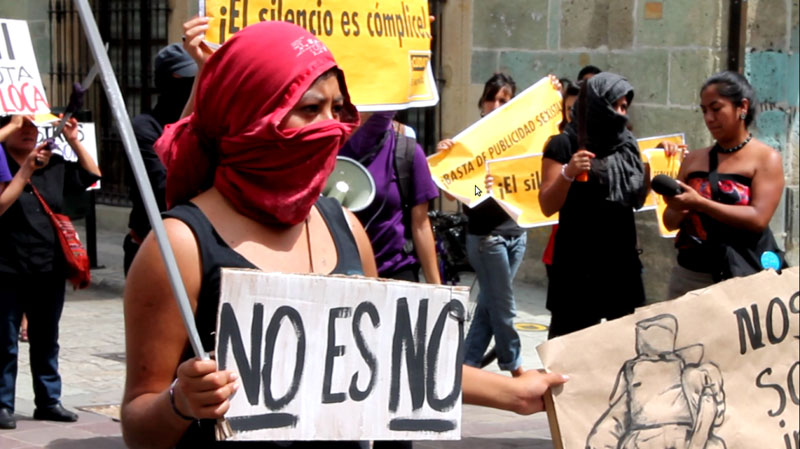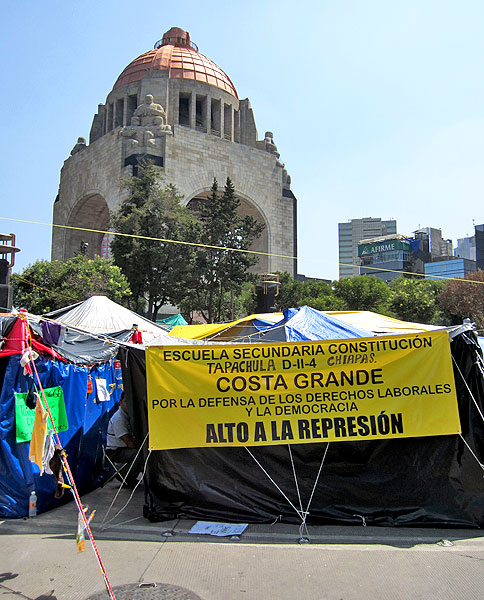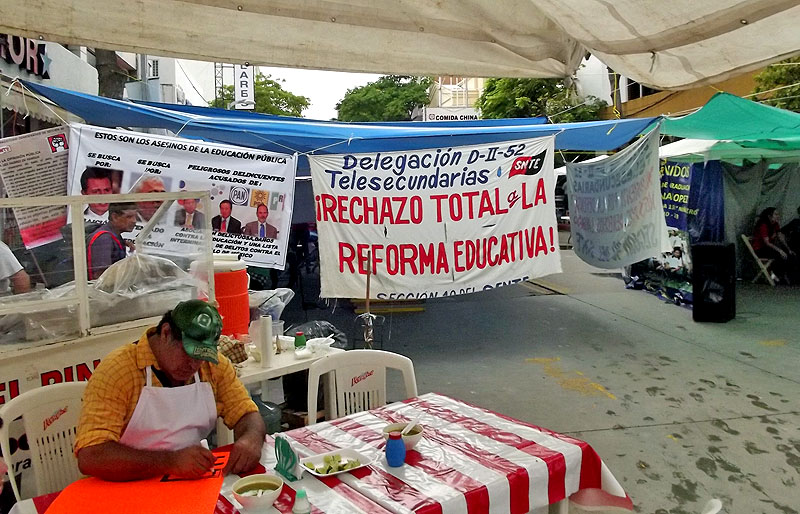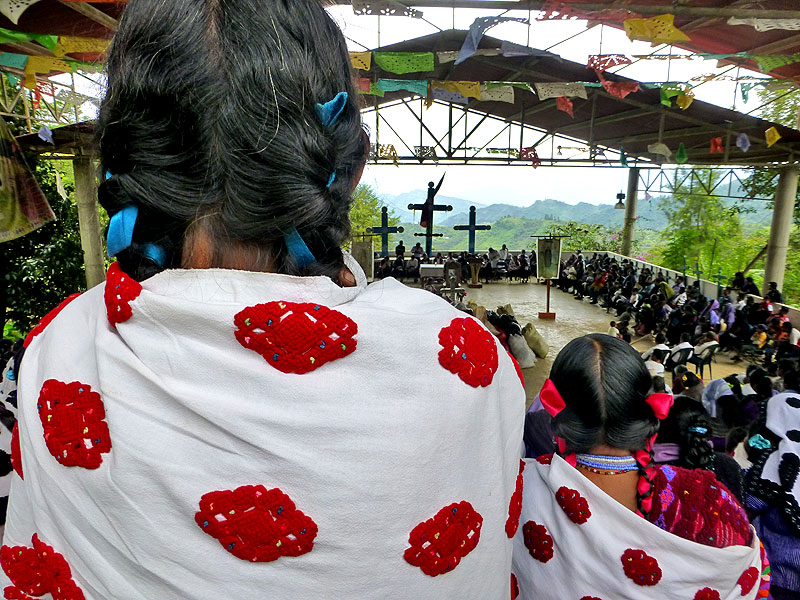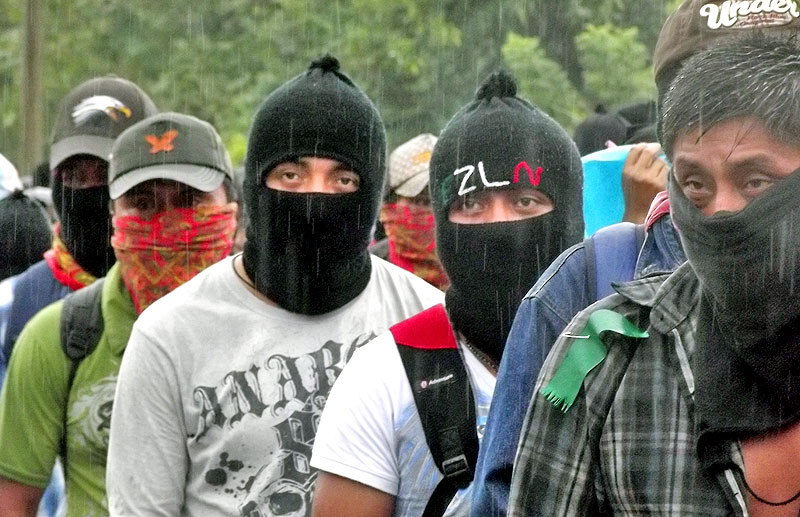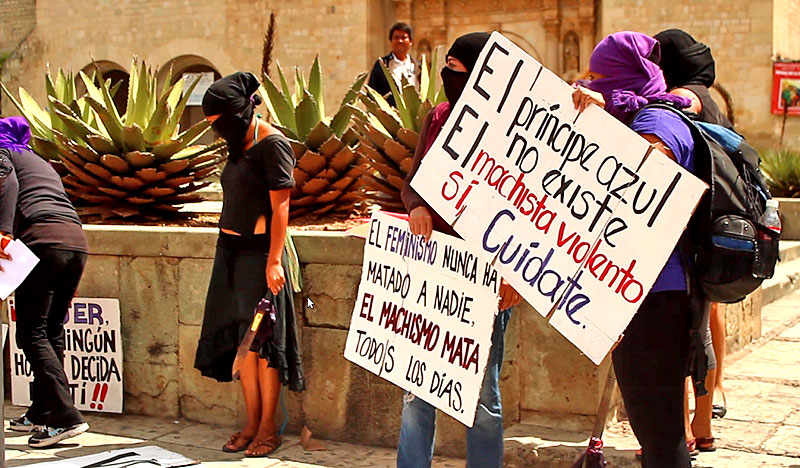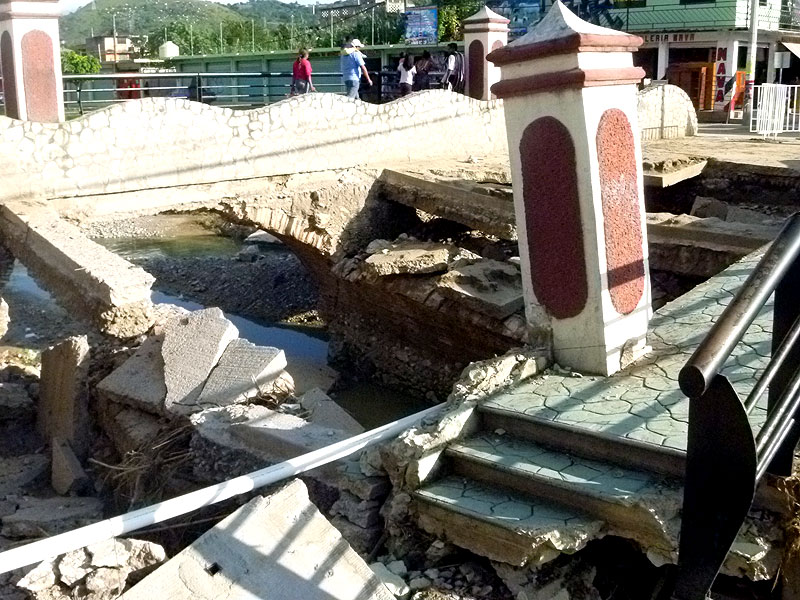SIPAZ ACTIVITIES (From mid-May to mid-August 2013)
04/09/2013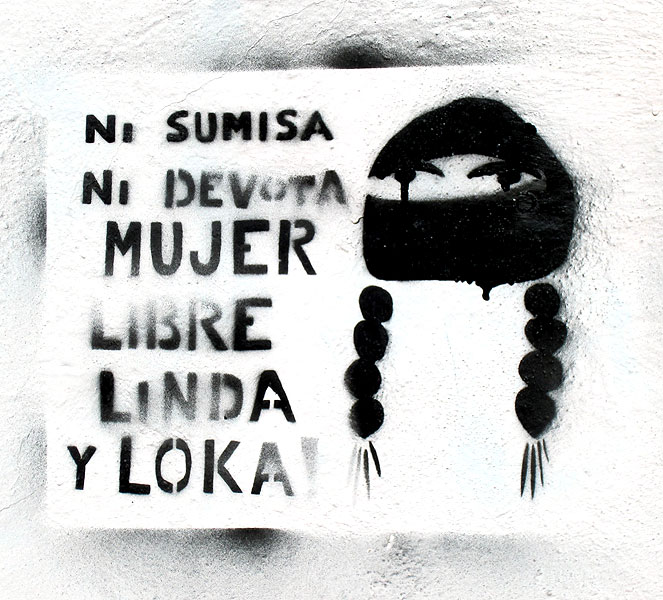
IN FOCUS: Violence against Women – “In Mexico they forget to punish those responsible”
26/11/2013On 1 September the Mexican federal government submitted its First Report, a document that identifies a number of challenges the ruling Institutional Revolutionary Party (PRI) seeks to overcome, many of them by means of the structural reforms which the administration has prioritized during its first year. In this sense, opposition parties made a number of criticisms stressing inefficiency, the economic crisis, and prevailing ungovernability. Several protest marches, such as the one organized by the National Coordination of Educational Workers (CNTE) against school reform, have developed in response. Protests resulted in confrontations between police and dissidents, leaving 16 youth arrested.
The following weeks saw an even greater multiplication of marches, roadblocks, and other acts of protest. The strongest process has been advanced by the teachers who have maintained a sit-in in Mexico City for three months now. Regardless, however, the majority of the mobilizations do not just focus on the rejection of proposed educational reforms but on the totality of the “structural reforms” promoted by Enrique Peña Nieto’s administration, including energy (currently under discussion) and finance (already approved).
On 2 October, the social movement marched to commemorate the student massacre of 1968. The mobilization was intercepted by a massive police operation, and confrontations left dozens injured—including 32 police—and more than a hundred arrested. Human rights observers confirmed that police used tear gas, rubber bullets, and even stones against protesters. They also noted that several plainclothes officers performed arbitrary arrests and “acts of provocation.”
On 14 October, teachers from Section 22 of the National Union of Educational Workers (SNTE), which had originally organized the mobilization, returned to work, though they affirmed that they would maintain their protests. Certainly, the teachers’ movement has not been deflated by the silence with which its demands have been received by the authorities; on the contrary, it has continued expanding its presence in Mexico City and at least twelve states. At the same time, numerous marches and acts of solidarity with the teachers’ protests have been conducted by students’ families and students themselves, as well as by civil and social organizations.
In other news, since September, the Movement for National Regeneration (MORENA), the social base of ex-presidential candidate Andrés Manuel López Obrador (AMLO), has been carrying out mass mobilizations against the proposed energy reform, which it believes serve neoliberal interests and remove from the State the exclusive management of strategic areas pertaining to the petroleum and electricity industries. AMLO and Cuauhtémoc Cárdenas, both former mayors of Mexico City and oppositional ex-presidential candidates, came together to affirm that the energy reform implies “an act of treason against the country.” The Party of the Democratic Revolution (PRD) for its part has been attempting to advance the imprecise slogan of “modernization without privatization.”
As a result of the teachers’ and grassroots mobilizations and pressure from society at large, the fiscal reform finally submitted by Peña Nieto was much reduced from previous proposals, as it renounced sales taxes on foods and medicines, but there was otherwise no retreat from the proposal.
Human Rights: 176 recommendations made to Mexico during the Universal Periodic Review (UPR)
During the second Universal Periodic Review (UPR) of Mexico carried out by the UN Human Rights Council (HRC) in Geneva, Switzerland, on 23 October, member-states issued 176 recommendations for the Mexican government (four years ago, the government received 91). The points which were most stressed included the lack of protection for human rights defenders and journalists, the persistence of laws allowing for extrajudicial detention, and military tribunals in the case of human rights violations committed by soldiers, in addition to the situation of women and other vulnerable social groups, such as migrants and indigenous peoples. It is important to stress that the questions addressed by the UPR this time had also been raised during the previous UPR of 2009. Now, four years later, these continue to be pressing issues. Mexico will have to analyze these recommendations, and in March 2014 report to the UNHCR its plan of action to address them.
For their part, different civil organizations have indicated a grave deterioration of the human rights situation in the country. They have emphasized that although the Mexican government has presented several legal initiatives having to do with human rights, it has not done enough to put them into practice, nor has it ratified international conventions to demonstrate its commitments in this direction. It should be recalled that, in September, the Supreme Court for Justice in the Nation (SCJN) decided to restrict the relevance of international human rights conventions that contradict the Mexican Constitution. Civil organizations have opined that this decision could lead to the nullification of the advances seen in the constitutional reform made in June 2011 in favor of human rights.
Chiapas: between marches and roadblocks
In Chiapas since the end of August, teachers from Section 7 and 40 have been marching, as have students and their families. There have been sit-ins, roadblocks, the “liberation” of the tollbooth between San Cristóbal and Tuxtla Gutiérrez, and closures of access roads to the capital. The Chiapas Tower, where governmental offices and a TV Azteca studio are located, has been occupied on two occasions, and the Pemex Tower was blockaded, preventing the entrance or exit of petroleum. At different times there have also been blockades of large commercial centers as well.
The parents of students have provided solidarity to the teachers by marching alongside them on 2 and 12 October. More than three thousand people joined the State and Regional Democratic Committee of Chiapas Parents in Defense of Public Education and the Nation, an organization that has prohibited interim teachers hired by the state government from entering schools to replace striking teachers and shut down schools that continued to hold class. In October, the group’s members occupied 59 City Halls and the State Congress. Primary school students together with students of technical institutions and high schools have similarly occupied the classrooms.
Despite the loss of income resulting from the strike, in addition to the campaign of intimidation and defamation which has been directed against teachers, the attempt to organize “counter-protests” which have coerced female beneficiaries of the Oportunidades program to march to demand a return to classes, and the multiplication of rumors (including supposed ties with armed groups), the teachers’ movement continues its struggle with no clear prospect for resolution on the horizon.
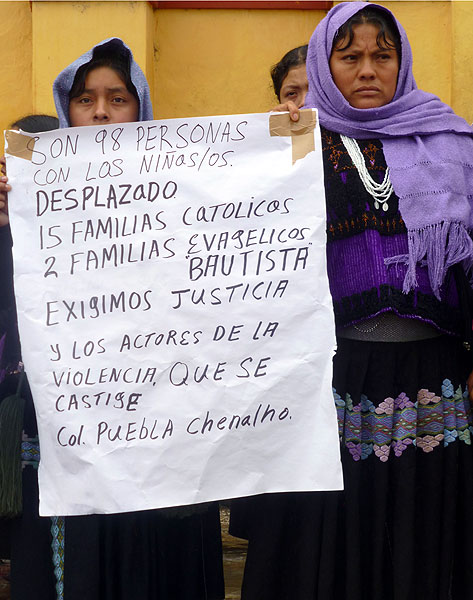
© SIPAZ
Other mobilizations have also taken place during this time: on 10 October in Palenque there was a march in defense of Mother Earth, organized by indigenous organizations. These groups expressed their lack of patience with governmental programs such as FANAR (previously PROCEDE) and the National Crusade against Hunger, which result in divisions among communities rather than promoting social and economic development. On 12 October, the Believing People (Pueblo Creyente) of Simojovel carried out a pilgrimage to protest the growing violence seen in the municipality. This same day there were marches held in San Cristóbal to observe the “Campaign against Violence against Women and Femicide in Chiapas.”
Tensions in several other parts of the state
One of the most critical cases with apparent religious overtones which continues without resolution is seen in the Chenalhó municipality. On 20 August there was a failed attempt to return to the Puebla Colony on the part of members of this ejido who had spent 30 days displaced in San Cristóbal de Las Casas. This return could not be completed due to the verbal and physical attacks directed against the displaced people and the civil caravan that accompanied them. On 21 August, the parish priest from Chenalhó was detained in Puebla, beaten, and tied up for 5 hours while he was threatened with burning with gasoline. On 23 August nearly all the Catholic families joined with some families of other religions in fleeing to San Cristóbal. On 26 August they decided to return to the region, though not to their specific community. 95 persons, including 13 Catholic families and 2 Baptist families, moved to Acteal, where they have remained to this date. The Las Abejas Civil Society has denounced that “the paramilitaries of Chenalhó have now been reactivated, firing their guns and causing displacement, just as in 1997,” the year of the Acteal massacre.
In October, five months after the forced displacement of these families, civil organizations denounced the tepid intervention from the state government regarding the investigation and judicial intervention in the case. In November, the Pastoral Team from the Tsotsil zone organized a pilgrimage to Acteal to demand “the immediate resolution of the problems faced by the Puebla community.” They reviewed the death threats and aggressions suffered by those displaced from Colonia Puebla and denounced that “the authorities from the three levels of government have not just stood by with their arms crossed while our rights have been violated, but they have actually been helping the violators.”
Other cases continue to produce high tensions. The Samuel Ruiz García Committee for the Promotion and Defense of Life in September denounced that “Fernando Coello, grandfather of the current governor, presented himself accompanied by others before a youth group belonging to the juvenile coordination of the Chicomuselo Parish […]. After arrogantly declaring his name, he asked for the parish priest […] saying that he was seeking him out to tell him that they will begin [again] to exploit the mineral resources of the municipality, […] and that it wouldn’t do to oppose them, since they will do it anyway.” On 31 October, the same Committee denounced that mining firms seek to reactivate the La Revancha mine belonging to the Nueva Morelia ejido, which previously had been shuttered in 2009 after the murder of anti-mining leader Mariano Abarco. It should be noted that numerous actions have been organized since 2008 to prevent further mining activity in Chicomuselo. Anti-mining activist Mariano Abarca was assassinated in 2009, after which the state government shut down the mining activities that had been underway. Unfortunately, the extraction permit continues to be valid, and certain actors have expressed their interest in reactivating mining operations.
In November, residents and ejidal authorities of San Sebastián Bachajón who adhere to the Sixth Declaration of the Lacandon Jungle denounced threats of displacement resulting from a dispute over a gravel supply that previously had been used “for the good of the people,” but is now desired as the sole property of an officialist group from the same ejido. The ejidatarios also denounced the kidnapping of a youth in November, indicating that those responsible “participated in the armed group that displaced our comrades at the toll booth on 2 February 2011.”
EZLN: communiques and denunciations
In a communiqué published on 3 November entitled “Bad and not so bad news,” the Zapatista Army of National Liberation (EZLN) gave an accounting-–both figuratively and literally–-of the first generation of the “Escuelita” (Little School) which was held in August, with the participation of 1,281 students. The EZLN announced the new sessions planned for December and January. Through the voice of Subcomandante Insurgente Marcos, the EZLN also criticized the “badly hidden lies” called “structural reforms.” Marcos noted that the “well-behaved Left” is now united in a “holy crusade” with the traditional Right to accuse anarchists, young and old, of being responsible for everything that is wrong with the country.
For its part, in October, the La Realidad Good Government Council (JBG) denounced aggressions targeting Zapatista support bases in the Che Guevara territory of the Tierra y Libertad autonomous municipality (official municipality of Motozintla de Mendoza). In November, the La Garrucha JBG denounced the harassment by the Trucking Center of Ocosingo against independent truck drivers, including one Zapatista support base member who has had his trucks detained and confiscated. The same JBG related the false accusation and arrest order directed against a Zapatista support base member for cutting down a tree. In this same month, the Morelia JBG denounced the worsening problems with CIOAC (Independent Center for Agricultural Workers and Campesinos) over land being farmed by Zapatista support bases from the “10 de abril” ejido.
The Patishtán Case: finally free
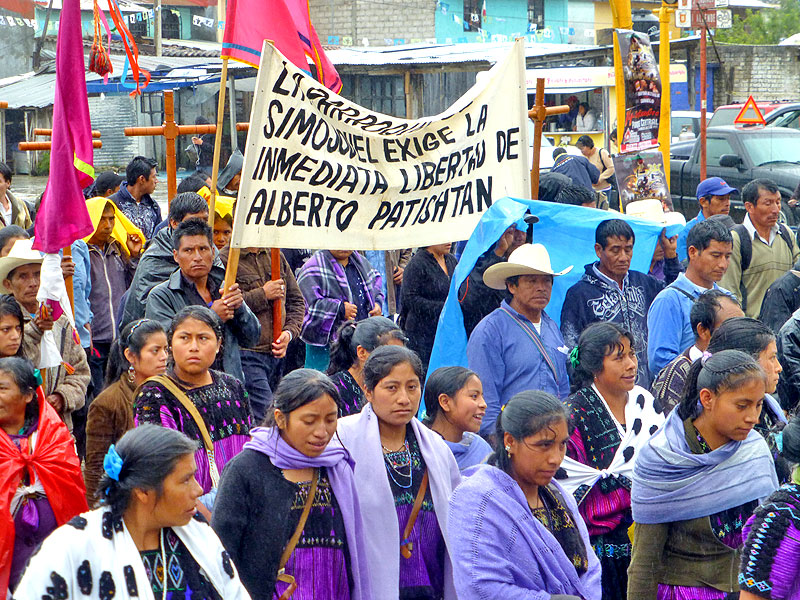
© SIPAZ
In August, Amnesty International (AI) joined the call for the release of Alberto Patishtán, a Tsotsil schoolteacher from El Bosque who had been imprisoned since 2000. In August, close to 1,500 people belonging to the Tsotsil Team of the Believing People (Pueblo Creyente), in addition to members of national and international organizations, held a pilgrimage in Tuxtla Gutiérrez making the same demand. In September, the First Collegiate Tribunal based in that city declared the motion for the recognition of innocence initiated by Patishtán to be unfounded. The decision took place hours after thousands of members of the Pueblo Creyente marched in a pilgrimage in San Cristóbal to demand his release.
However, on 31 October, Alberto Patishtán was released after having received an official pardon from President Enrique Peña Nieto. Patishtán declared that “They wanted to extinguish my light, put it to rest–-but what happened is that it was multiplied, though they wanted to cover it up. That only made my struggle shine more brightly.” The Fray Bartolomé de Las Casas Center for Human Rights released a press bulletin expressing that the pardon is not sufficient justice for Patishtán, and demanding a public apology from the State and comprehensive reparations for the damages incurred by the Tsotsil teacher and his family.
Oaxaca: Between teachers’ mobilizations and attacks on the social movement
Within the context of the conflicts ignited by the educational reforms put forward by the federal government, the teachers’ union Section 22 of Oaxaca has participated actively in mobilizations. During this time there have been numerous marches and acts in solidarity with the teachers’ protest, led by students and their families in Oaxaca state.
Various attacks on members of social movements and political parties have taken place in recent months. On 10 September, Everardo Hugo Hernández Guzmán, president of the Permanent Commission for Social Development of the LXI local Legislature, was murdered. He was one of the founders of the Committee of Defense of the Rights of the People (CODEP). On 16 October, Juan Sosa Maldonadao, representative of the Organization of Indigenous Zapotec Peoples (OPIZ), suffered an attempt on his life in Oaxaca de Juárez that left him unharmed.
On 25 August, members of the Popular Assembly of the Juchiteco People (APPJ) were attacked with knives and firearms as they were patrolling the communal lands where the Bií Bioxho wind-energy parks being build by Fenosa Natural Gas. The assailants were later denounced as hired guns working for the firm. On 3 September, Mariano López, APPJ spokesperson, suffered an attempted kidnapping in the city of Juchitán. On 5 October, unknown persons burned down the resistance camp that the APPJ had maintained since February in opposition to the plans to build Bií Bioxho.
Also in relation to the movement of resistance against the construction of mega-projects in the Tehuantepec Isthmus, on 9 October a new injunction was handed down in favor of the communards of San Dionisio del Mar, which calls for the temporary suspension of the construction project in which Mareña Renewables wants to build a wind energy park in la Barra de Santa Teresa, lands that belong to San Dionisio del Mar. The decision was welcomed by the Assembly of Indigenous Peoples of the Isthmus in Defense of Land and Territory (APIIDTT) as a great victory in the struggle for the respect of the territory and rights of indigenous people.
On 13 October dozens of women marched through the center of Oaxaca City, in the first action carried out by the “Radical Antipatriarchal Action” collective, a social collective that seeks to expose all types of violence against women and to propose self-defense and autonomy as the best means of changing the situations they face. On 2 October, Day of the Dead, an altar was installed to commemorate the women murdered in the state and the country.
With regard to communication, on 4 and 5 September the Totopo Communal Radio was relaunched in the city of Juchitán de Zaragoza. The radio had not broadcast since 26 March, when, following the attempted displacement by police of the APPJ resistance camp, a group of individuals entered the radio’s offices, stealing the transmitter and cutting the electricity cables. Lastly, between 7 and 13 October, the second Continent Meeting for Indigenous Communication of Abya Yala was held in the Tlahuitoltepec Mixe community. This event was surrounded by controversy due to the fact that the coordinators had invited President Enrique Peña Nieto to the inauguration; for this reason, some Mexican and foreign organizations withdrew from the event.
Guerrero: Campaign to “liquidate” the social movement?
In recent months, apart from the emergency situation suffered by those subjected to the flooding from the storms which devastated the state in September, there have been several moments of mobilization and tension. Although they have not been as massive or recurrent as in other states, dissident teachers’ mobilizations against the education reforms have emerged in Guerrero as well. On 11 September, some 5,000 teachers from the State Coordination of Educational Workers (CETEG) marched in protest. They suspended activities in accordance with the call for national mobilization made by the CNTE.
In the Costa Grande region the situation of extreme insecurity for human rights defenders, as well as the general populace, persists. Non-governmental organizations led by the Tlachinollan Mountain Center for Human Rights have concluded that the administration of PRD Governor Ángel Aguirre Rivero is engaged in a full-scale “campaign of liquidation” targeting activists. On 19 October, the social activist Rocío Mesino Mesino was killed in the Atoyac de Álvarez municipality. Iñaki Blanco Cabrera, State Attorney General, has said that different lines are being pursued in the investigation of this murder of the leader of the Campesino Organization of the Southern Sierra (OCSS), including the participation of organized crime syndicates which operate in the region of the Costa Grande region of the state. On 10 November in Coyuca de Benítez, Luis Olivares, director of the Union of Producers of the Costa Grande (UPCG), was murdered along with his partner Ana Lilia Gatica. His former wife Zeferina Romero Fernández has said that “he did not have enemies; I believe it was the government itself [who did it].” With this death, the number of activists murdered so far during the term of the present administration reaches 12.
In recent months also there has been repression targeting members of the communal system of justice belonging to the Regional Coordination of Communal Authorities or “community police” (CRAC). As part of the campaign of formal credentialing of the community police promoted by the Ángel Aguirre government, several members of this system have been arrested. On 21 August, Nestora Salgado García, director of the Community Police, was arrested in Olinalá. To date she continues to be held in a high-security prison in Nayarit. Some days after the arrest, community police from Ayutla were detained and disarmed by soldiers. On 6 October, 12 community police from the House of Justice in Zitlaltepec were arrested, with 11 subsequently released on bail.
After the floods of September, the Council of Ejidos and Communities Opposed to the La Parota Dam (CECOP) denounced that there were serious damages to communities in Cacahuatepec because the Federal Electricity Commission (CFE) opened the La Venta dam. Campesinos of the region have expressed their concern over the state and federal governments’ attempts to displace them using the pretext of relocating the peoples living along the banks of the Papagayo River, so that the path be clear to whoever wishes to move forward with construction of the La Parota hydroelectric dam project.
On 14 November, campesinos of the Mountain Region of Guerrero presented a legal motion to demand the cancellation of mining concessions, arguing that such mining operations violate the rights of indigenous people to be consulted regarding projects that affect their territory and culture. Their concern is based on information showing that in the Mountain and Costa Chica regions, there are 42 mining sites, with another 30 concessions which the federal government has just awarded for 50 years.

